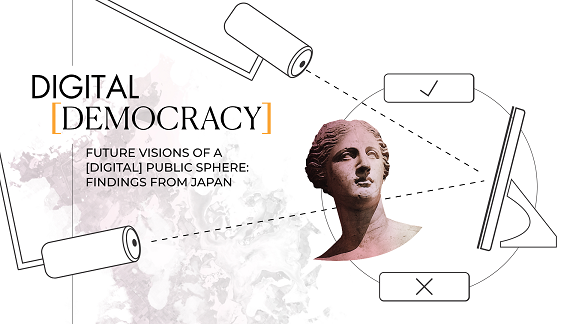Future Visions of a (Digital) Public Sphere: Findings from Japan
 © Deutsches Institut für Japanstudien (DIJ)
© Deutsches Institut für Japanstudien (DIJ)
Event Information
July 14, 2020, 6:30 PM to 8:00 PM
Online
Organizer(s): Deutsches Institut für Japanstudien (DIJ)
With the pandemic since early 2020, the use of online platforms has increased in most societies. Consequently, providers of digital platforms have gained substantial influence on how people inform themselves, for example about the novel coronavirus or political topics. However, many posts and publications include falsified or unproven data (better known as “fake news”), also in Japan. Several providers have amended their policies to combat the rise of fake news (e.g. Twitter etc.). These changes of corporate policies and further reactions by several governments regarding the role of such providers illustrate that the structures and communication patterns via these digital platforms are still in motion and, therefore, subject to structural design decisions.
In our talk, we present findings from an ongoing research project on Digital Democracy at the Kyoto Design Lab (since February 2020). In the course of our research we raise the question how the status quo and the future of the aforementioned digital platforms can be explored collectively with regards to issues like fake news, democratic values or privacy. Therefore, we organized speculative design workshops to collectively generate future scenarios manifested in design applications on these digital public spheres. We argue that the resulting scenarios, which arise from the subjective experiences of their speculators and, hence, reveal individual hopes and fears, allow us to explore and discuss utopian and dystopian visions of technological futures and alternative realities. This method allows for a great variety of participants to create and communicate their own narratives as well as for a broad audience to reflect upon and discuss about these scenarios. We will present findings of two workshops conducted in April and June 2020 in Kyoto.
Chiara Ullstein is a political scientist (MSc Politics & Technology, Technical University of Munich) and visiting design researcher at Kyoto Design Lab (Kyoto Institute of Technology). Her research focuses on the impact of AI on societies, its governance and the exploration and assessment of AI-driven futures.
Michel Hohendanner is a graphic and social designer (MA Advanced Design, Munich University of Applied Sciences) and visiting design researcher at Kyoto Design Lab (Kyoto Institute of Technology). His research interests include design applications linking technological development and social as well as political value systems, especially in the context of digital public environments.
About: The DIJ Social Science Study Group is a forum for scholars conducting research on contemporary Japan. Meetings are held once a month and are open to speakers from all disciplines of the social sciences. The event is open to all. Registration is necessary via brucksch@dijtokyo.org
Registration required: until 13 July, 2020 (JST).
Log in data will be provided after registration.
